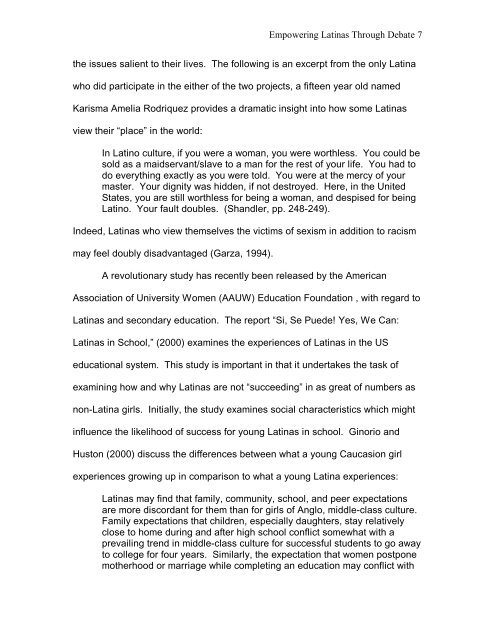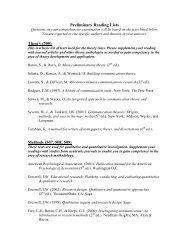Empowering Latinas Through Debate - College of Communications ...
Empowering Latinas Through Debate - College of Communications ...
Empowering Latinas Through Debate - College of Communications ...
Create successful ePaper yourself
Turn your PDF publications into a flip-book with our unique Google optimized e-Paper software.
<strong>Empowering</strong> <strong>Latinas</strong> <strong>Through</strong> <strong>Debate</strong> 7<br />
the issues salient to their lives. The following is an excerpt from the only Latina<br />
who did participate in the either <strong>of</strong> the two projects, a fifteen year old named<br />
Karisma Amelia Rodriquez provides a dramatic insight into how some <strong>Latinas</strong><br />
view their “place” in the world:<br />
In Latino culture, if you were a woman, you were worthless. You could be<br />
sold as a maidservant/slave to a man for the rest <strong>of</strong> your life. You had to<br />
do everything exactly as you were told. You were at the mercy <strong>of</strong> your<br />
master. Your dignity was hidden, if not destroyed. Here, in the United<br />
States, you are still worthless for being a woman, and despised for being<br />
Latino. Your fault doubles. (Shandler, pp. 248-249).<br />
Indeed, <strong>Latinas</strong> who view themselves the victims <strong>of</strong> sexism in addition to racism<br />
may feel doubly disadvantaged (Garza, 1994).<br />
A revolutionary study has recently been released by the American<br />
Association <strong>of</strong> University Women (AAUW) Education Foundation , with regard to<br />
<strong>Latinas</strong> and secondary education. The report “Si, Se Puede! Yes, We Can:<br />
<strong>Latinas</strong> in School,” (2000) examines the experiences <strong>of</strong> <strong>Latinas</strong> in the US<br />
educational system. This study is important in that it undertakes the task <strong>of</strong><br />
examining how and why <strong>Latinas</strong> are not “succeeding” in as great <strong>of</strong> numbers as<br />
non-Latina girls. Initially, the study examines social characteristics which might<br />
influence the likelihood <strong>of</strong> success for young <strong>Latinas</strong> in school. Ginorio and<br />
Huston (2000) discuss the differences between what a young Caucasion girl<br />
experiences growing up in comparison to what a young Latina experiences:<br />
<strong>Latinas</strong> may find that family, community, school, and peer expectations<br />
are more discordant for them than for girls <strong>of</strong> Anglo, middle-class culture.<br />
Family expectations that children, especially daughters, stay relatively<br />
close to home during and after high school conflict somewhat with a<br />
prevailing trend in middle-class culture for successful students to go away<br />
to college for four years. Similarly, the expectation that women postpone<br />
motherhood or marriage while completing an education may conflict with













